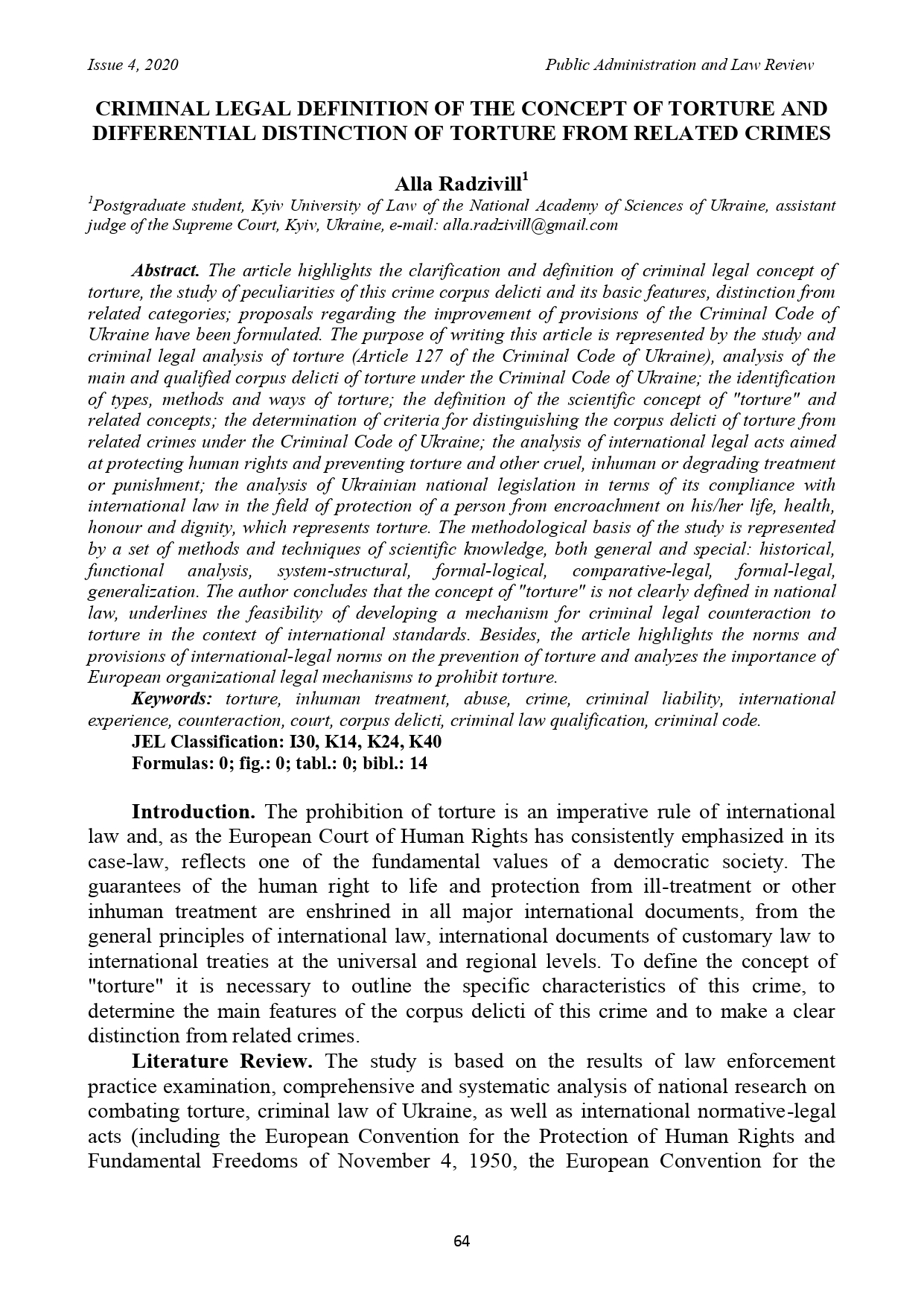CRIMINAL LEGAL DEFINITION OF THE CONCEPT OF TORTURE AND DIFFERENTIAL DISTINCTION OF TORTURE FROM RELATED CRIMES
DOI:
https://doi.org/10.36690/2674-5216-2020-4-64Keywords:
torture, inhuman treatment, abuse, crime, criminal liability, international experience, counteraction, court, corpus delicti, criminal law qualification, criminal codeAbstract
The article highlights the clarification and definition of criminal legal concept of torture, the study of peculiarities of this crime corpus delicti and its basic features, distinction from related categories; proposals regarding the improvement of provisions of the Criminal Code of Ukraine have been formulated. The purpose of writing this article is represented by the study and criminal legal analysis of torture (Article 127 of the Criminal Code of Ukraine), analysis of the main and qualified corpus delicti of torture under the Criminal Code of Ukraine; the identification of types, methods and ways of torture; the definition of the scientific concept of "torture" and related concepts; the determination of criteria for distinguishing the corpus delicti of torture from related crimes under the Criminal Code of Ukraine; the analysis of international legal acts aimed at protecting human rights and preventing torture and other cruel, inhuman or degrading treatment or punishment; the analysis of Ukrainian national legislation in terms of its compliance with international law in the field of protection of a person from encroachment on his/her life, health, honour and dignity, which represents torture. The methodological basis of the study is represented by a set of methods and techniques of scientific knowledge, both general and special: historical, functional analysis, system-structural, formal-logical, comparative-legal, formal-legal, generalization. The author concludes that the concept of "torture" is not clearly defined in national law, underlines the feasibility of developing a mechanism for criminal legal counteraction to torture in the context of international standards. Besides, the article highlights the norms and provisions of international-legal norms on the prevention of torture and analyzes the importance of European organizational legal mechanisms to prohibit torture.
Downloads
References
Constitution of Ukraine [E-source] // Journal of the Verkhovna Rada of Ukraine (JVR). – 1996. – No. 30. – p. 141. – Access mode: http://zakon5.rada.gov.ua/laws/show/254%D0%BA/96-%D0%B2%D1%80
[in Ukrainian]
Convention for the Protection of Human Rights and Fundamental Freedoms of 1950, First Protocol and Protocols Nos. 1, 4, 6, 7, 9, 10, 11 and 13 to the Convention (Rome, 4.XI. 1950) // Prof. legal comp. system “Infodisk: Legislation of Ukraine” [in Russian]
International Covenant on Civil and Political Rights (the International Covenant has been ratified by the Decree of the Presidium of the Supreme Soviet of the Ukrainian Soviet Socialist Republic No. 2148-VIII (2148-08) of 19.10.73) [in Russian]
Convention against Torture and Other Cruel, Inhuman or Degrading Treatment or Punishment // Journal of the Supreme Soviet of the Ukrainian Soviet Socialist Republic - 1987. - No. 6, p.101 [in Russian]
European Convention for the Prevention of Torture and Inhuman or Degrading Treatment or Punishment of 26.11.1987. [E-source]. – Access mode: https://zakon.rada.gov.ua/laws/show/995_068#Text [in Ukrainian]
O. Yaremko. Legislative Regulation of Criminal Liability for Torture in Ukraine / O. Yaremko // Scientific Information Bulletin. – 2013. – No. 8. – P. 176–181.]. [in Ukrainian]
On the Protection of All Persons from Being Subjected to Torture and Other Cruel, Inhuman or Degrading Treatment or Punishment: UN Declaration, 9 December 1975 [E-source] – Access mode: http://zakon3.rada.gov.ua/laws/show/995_084.] [in Russian]
Guidelines for Physicians Concerning Torture and other Cruel, Inhuman or Degrading Treatment or Punishment in Relation to Detention and Imprisonment: WMA Declaration of Tokyo, 1 October 1975 [E-source]. – Access mode: http://zakon3.rada.gov.ua/laws/show/990_011 [in Russian]
Against Torture and Other Cruel, Inhuman or Degrading Treatment or Punishment: UN Convention, 10 December 1980 [E-source]. – Access mode: http://zakon2.rada.gov.ua/laws/show/995_085 [in Ukrainian]
To Prevent and Punish Torture: Inter-American Convention of the Organization of American States, 9 December 1985 [E-source]. – Access mode: http://zakon2.rada.gov.ua/laws/show/995_068.] [in Ukrainian]
Viktor Filatov. «The Phenomenon of Torture: Constitutional and Legal Aspect». E-source. Access mode: http://pk.khpg.org/index.php?id=1487855321 [in Ukrainian]
Criminal Code of Ukraine: Law of Ukraine of 05.04.2001 No. 2341-III // Journal of the Verkhovna Rada of Ukraine. – 2001. – No. 25–26. – Art. 131 [in Ukrainian]
Yu Krychun. "The Problem of Distinguishing Torture from Some Related Crimes." Entrepreneurship, Economy and Law 5 (2017): 201-204 [in Ukrainian]
N. Maliarchuk. «Issues of Qualification and Distinguishing of Torture from Related Crimes» / N. Maliarchuk, А. Rozdilna // Journal of Eastern European Law. – 2018. – No. 58. – P. 103-108. [in Ukrainian]

Additional Files
Published
How to Cite
Issue
Section
License
Copyright (c) 2020 Scientific Center of Innovative Researches OÜ

This work is licensed under a Creative Commons Attribution 4.0 International License.





